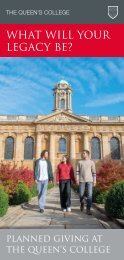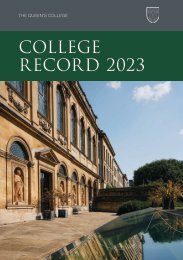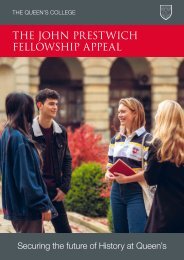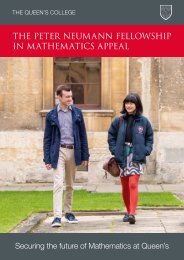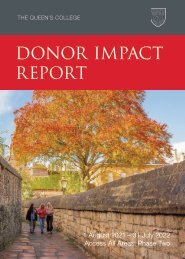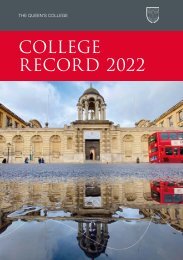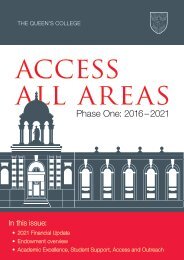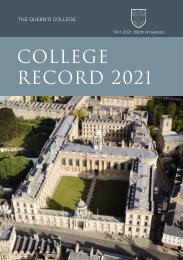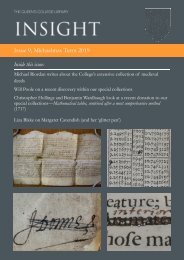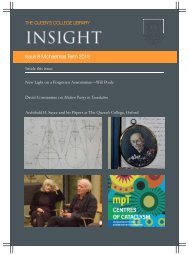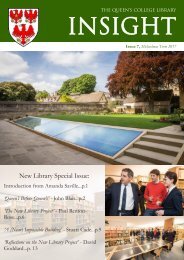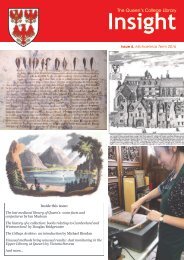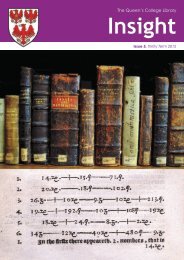Eagle Eye Magazine Issue 1 2023
Take a dive into the research and work that's going on at The Queen's College and beyond its walls within the community of Old Members. In issue one, we celebrate Shakespeare's First Folio, ask our history Fellows what makes them passionate about their subject, explore the new accessible Porters' Lodge, ask a current student about how to engage positively with climate issues, and much more.
Take a dive into the research and work that's going on at The Queen's College and beyond its walls within the community of Old Members. In issue one, we celebrate Shakespeare's First Folio, ask our history Fellows what makes them passionate about their subject, explore the new accessible Porters' Lodge, ask a current student about how to engage positively with climate issues, and much more.
You also want an ePaper? Increase the reach of your titles
YUMPU automatically turns print PDFs into web optimized ePapers that Google loves.
TEACHING<br />
WITH THE FIRST FOLIO<br />
Career Development Fellow in English Dr Jen<br />
Edwards* uses the First Folio in her teaching.<br />
We found out more about how and why she<br />
uses this treasure to inspire current students.<br />
How do you use the First Folio in your teaching, and what do<br />
you think this approach brings to the students’ understanding<br />
and appreciation of the works?<br />
I tend to hold my first class of the teaching term in the library<br />
with Librarian Dr Matthew Shaw – it’s a bit of a literary<br />
‘sweet shop’, where we look at Shakespeare’s Folio(s) and an<br />
assortment of other early modern texts from the vault: religious<br />
proclamations; anatomy books; pamphlets; poems. Beyond being<br />
a real treat, looking at the Folio in particular is useful in helping<br />
unsettle the idea of Shakespeare’s works as fixed, stable entities<br />
from the get-go: the Folio was published after Shakespeare died,<br />
the tripartite splitting of plays into categories of Comedy, History,<br />
or Tragedy isn’t his, and some of the plays existed in different<br />
versions before the Folio was printed. So, we start with this book,<br />
looking at the famous image of Shakespeare (also done after he<br />
died), the title page, some of the typos and annotations, and use<br />
this to think about what exactly it means to study ‘Shakespeare’.<br />
My hope is that students leave the room feeling that these works<br />
remain ‘up for grabs’ and open to interpretation.<br />
Shakespeare is unusual in that he has his own paper on the<br />
English degree at Oxford, but I think it’s important that we don’t<br />
just think about him in a vacuum, as being somehow separate<br />
from other concerns and work of the time. What excites me as<br />
a researcher, and as a teacher, are the crosscurrents between<br />
Shakespeare’s work and those of his contemporaries – putting his<br />
work in dialogue with, say, writing about medicine or philosophy,<br />
can really bring the texts to life. We know Shakespeare borrowed<br />
lots of material too so it’s useful to look at some of his sources<br />
and see what he takes and what he changes. I guess I also don’t<br />
agree with the idea that Shakespeare’s plays are just meant to<br />
be performed and not read, which is something you hear often<br />
but I have always found this a bit frustrating and reductive –<br />
there is so much we can gain from reading these works and from<br />
thinking about them as material, printed texts.<br />
How do you think students today respond to Shakespeare?<br />
One of the great things about studying Shakespeare at Oxford is<br />
that students can approach the plays and poems from so many<br />
different angles: there is no set way to read or think about these<br />
texts, so responses to Shakespeare can be shaped by, for example,<br />
an interest in gender studies, critical race, the environment,<br />
politics, medicine, translation etc.. It is important for us to keep<br />
asking ourselves about Shakespeare’s place in our canon (and to<br />
note that our responses don’t necessarily need to be positive to<br />
be productive), but each year I have found that students respond<br />
to these plays and poems in ways that position these texts not as<br />
out-of-date and stuffy, but as timely and urgent.<br />
Do you have a favourite Shakespeare play and why?<br />
Yes and no (I know that is cheating!). I have definitely had<br />
favourites, at various points, but my favourite changes –<br />
Othello was the first play I ever studied, ever saw, so it holds a<br />
particular power for me, but Hamlet is probably the play I find<br />
myself returning to and thinking about the most (surely, I can’t<br />
say Hamlet is my favourite? How unoriginal!). I guess my honest<br />
answer is that I just really enjoy whatever I am working on at<br />
the time, and that that will likely be in contention for top spot<br />
whenever I’m asked this question. Right now, that would be<br />
The Comedy of Errors and the narrative poems – the latter aren’t plays,<br />
obviously, but I want to plug them a little: the poems often get<br />
overlooked, and Venus and Adonis was far and away Shakespeare’s<br />
most popular work at the time, and it’s brilliant.<br />
Can you tell us a bit about your project that looks at issues of<br />
distraction at Shakespeare’s Globe?<br />
This project began back when I was in post at the Globe in 2019,<br />
where I led an oral history project that asked actors and directors<br />
how they responded to distractions in the space (a question<br />
informed by Hamlet’s line about ‘this distracted Globe’, as well<br />
as the grumblings of a particular theatre critic). We tend to think<br />
of distraction as a negative thing, but answers to this question<br />
often veered towards the positive – yes, noisy planes, bad weather,<br />
audience members wandering around can be a bit annoying, but<br />
there was a keen sense that distraction could also constitute and<br />
contribute to performance in this space in wonderful ways: that it<br />
is part of the ‘liveness’ of theatre, a shared experience that brings<br />
everyone in the space together during that particular show.<br />
The project weaves together things like actor interviews, show<br />
reports, and reviews, and pays attention to various distractions<br />
like the weather, fainting audience members, the recent global<br />
pandemic, and thinks about how those elements generate<br />
meaning. My book on this – This Distracted Globe: Attending to Distraction<br />
in Shakespeare’s Theatre – has just been published by Cambridge<br />
University Press.<br />
Jen’s tutorial with a Shakespeare First Folio | David Fisher<br />
* Dr Edwards left her post at Queen’s at the end of the academic year 2022-23 to take up a post<br />
as Assistant Professor in English and Theatre at the University of Warwick.<br />
11




